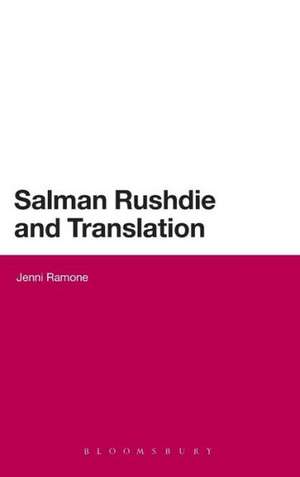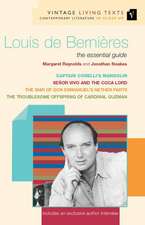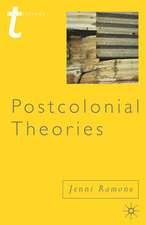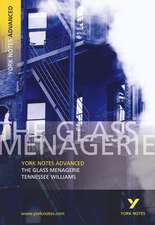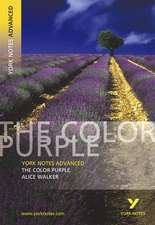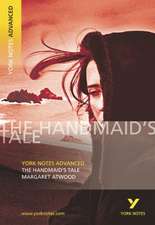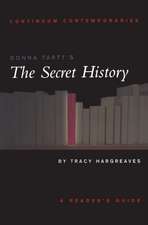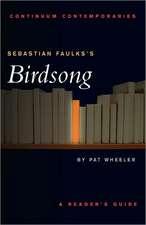Salman Rushdie and Translation
Autor Dr Jenni Ramoneen Limba Engleză Hardback – 11 sep 2013
| Toate formatele și edițiile | Preț | Express |
|---|---|---|
| Paperback (1) | 257.12 lei 43-57 zile | |
| Bloomsbury Publishing – 11 mar 2015 | 257.12 lei 43-57 zile | |
| Hardback (1) | 773.39 lei 43-57 zile | |
| Bloomsbury Publishing – 11 sep 2013 | 773.39 lei 43-57 zile |
Preț: 773.39 lei
Preț vechi: 990.21 lei
-22% Nou
Puncte Express: 1160
Preț estimativ în valută:
147.98€ • 154.93$ • 122.45£
147.98€ • 154.93$ • 122.45£
Carte tipărită la comandă
Livrare economică 07-21 aprilie
Preluare comenzi: 021 569.72.76
Specificații
ISBN-13: 9781441144355
ISBN-10: 1441144358
Pagini: 224
Ilustrații: black & white illustrations
Dimensiuni: 156 x 234 x 18 mm
Greutate: 0.5 kg
Ediția:New.
Editura: Bloomsbury Publishing
Colecția Bloomsbury Academic
Locul publicării:London, United Kingdom
ISBN-10: 1441144358
Pagini: 224
Ilustrații: black & white illustrations
Dimensiuni: 156 x 234 x 18 mm
Greutate: 0.5 kg
Ediția:New.
Editura: Bloomsbury Publishing
Colecția Bloomsbury Academic
Locul publicării:London, United Kingdom
Caracteristici
Examines Rushdie's appropriation of contemporary and historical narratives of independence and migration.
Notă biografică
Jenni Ramone is Senior Lecturer in Postcolonial Studies at Nottingham Trent University, UK. She is the author of Postcolonial Theories (Palgrave, 2011).
Cuprins
Introduction: Colonial and Postcolonial Translation \ 1. Translation as Temptation: Gaps, Silences, Seductions \ 2. 'Takallouf': the Unsayable, the Untranslatable \ 3. Translation as Transgression: Bad Language \ 4. Translation and Form: the Short Story \ 5. Kashmir and Paradise: Translating History \ 6. Translating Theory: if Grimus Fails \ 7. Paint, Patronage, Power, and the Translator's Visibility \ 8. Salman Rushdie: A Split Subject \ In Conclusion \ Appendix: Annotated Bibliography \ Bibliography \ Index
Recenzii
Jenni Ramone's Salman Rushdie and Translation brings together a detailed literary analysis of Rushdie's major works and a wide range of contemporary translation theories. Using Rushdie's texts as starting points, Ramone is able to illustrate how Rushdie constantly uses and develops ideas of translation in his narrration. Similarly, she evokes the applicability of the theories from the textual sources. This is a remarkable work deeply engaged with studies of Rushdie as well as translation theory. Undoubtedly this will become one of the more useful resources for scholars interested in Rushdie and translation alike.
Jenni Ramone's fascinating study finds in the idea of translation a refreshingly route into exploring Rushdie's examinations of cultural difference and the question of textuality across much of his considerable oeuvre. She utilises her exceptional grasp of canonical and current debates in both translation studies and postcolonial theory to explore how the play of translation is a constant concern in Rushdie's writing, allowing not only for new light to be shed on the major works, but also invaluable interpretation of less critically attended works like the early Grimus and the memoir Joseph Anton but also his short stories and writing for children. This is an original and important perspective on one of the most important writers of our age.
Jenni Ramone's fascinating study finds in the idea of translation a refreshingly route into exploring Rushdie's examinations of cultural difference and the question of textuality across much of his considerable oeuvre. She utilises her exceptional grasp of canonical and current debates in both translation studies and postcolonial theory to explore how the play of translation is a constant concern in Rushdie's writing, allowing not only for new light to be shed on the major works, but also invaluable interpretation of less critically attended works like the early Grimus and the memoir Joseph Anton but also his short stories and writing for children. This is an original and important perspective on one of the most important writers of our age.
